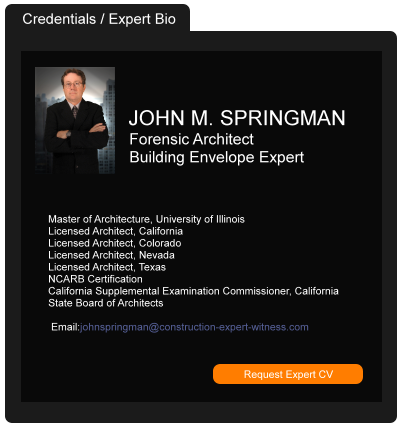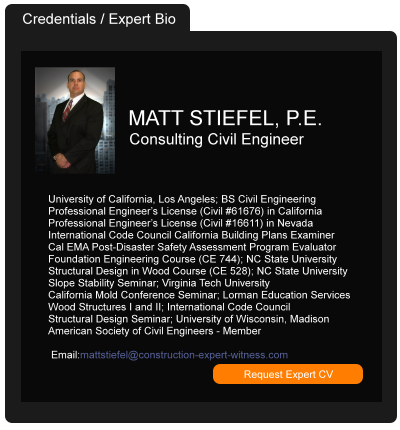Show Me the Money: The Good Faith Dispute Exception to Prompt Payment Penalties
March 13, 2023 —
Garret Murai - California Construction Law BlogCalifornia has a number of
prompt payment penalty statutes on the books. Among them is Civil Code section 8800 which requires project owners on private works projects to pay progress payments to direct contractors within 30 days after demand for payment pursuant to contract or be subject to prompt payment penalties of two percent (2%) per month on the amount wrongfully withheld. Like California’s other prompt payment penalty statutes, however, there is an important carve out: If there is a good faith dispute between the project owner and the direct contractor the project owner may withhold up to 150% of the dispute amount and not be subject to prompt payment penalties. And that, my friends, is a higher-tiered party’s “get out of jail free” card.
In a case of first impression, the 1st District Court of Appeals, in
Vought Construction Inc. v. Stock (2022) 84 Cal.App.5th 622, examined whether a project owner’s claim for liquidated damages constitutes a good faith dispute under Civil Code section 8800.
Read the court decisionRead the full story...Reprinted courtesy of
Garret Murai, Nomos LLPMr. Murai may be contacted at
gmurai@nomosllp.com
Single-Family Home Starts Seen Catching Up to Surging U.S. Sales
May 07, 2015 —
David Wilson – BloombergNew single-family houses are selling fast enough in the U.S. that homebuilders will have to pick up the pace of starting them, according to Neil Dutta, head of U.S. economics at Renaissance Macro Research LLC.
The attached chart compares annual growth rates in sales and starts, as compiled by the Commerce Department, during the past 25 years. The top panel shows the rates, while the bottom panel tracks the percentage-point gap between then.
Last month’s sales of one-family homes totaled 510,000 at an annual rate, according on the average estimate of economists in a Bloomberg survey. The projection amounts to a 26.6 percent increase from a year ago. Builders began working on 2.7 percent fewer homes in March, according to data released yesterday. The 29.3-point differential would be the widest since July 1995.
Read the court decisionRead the full story...Reprinted courtesy of
David Wilson, BloombergMr. Wilson may be contacted at
dwilson@bloomberg.net
Colorado Court of Appeals Defines “Substantial Completion” for Subcontractors’ Work so as to Shorten the Period of Time in Which They Can Be Sued
October 20, 2016 —
David M. McLain – Colorado Construction Litigation BlogOver the past few years, there has been a battle raging on in district courts and arbitration hearing rooms throughout Colorado regarding when a subcontractor’s work is to be deemed “substantially complete,” for purposes of triggering Colorado’s six-year statute of repose. C.R.S. § 13-80-104 states, in pertinent part:
Notwithstanding any statutory provision to the contrary, all actions against any architect, contractor, builder or builder vendor, engineer, or inspector performing or furnishing the design, planning, supervision, inspection, construction, or observation of construction of any improvement to real property shall be brought within the time provided in section 13-80-102 after the claim for relief arises, and not thereafter, but in no case shall such an action be brought more than six years after the substantial completion of the improvement to the real property, except as provided in subsection (2) of this section.
* * *
(2) In case any such cause of action arises during the fifth or sixth year after substantial completion of the improvement to real property, said action shall be brought within two years after the date upon which said cause of action arises.
C.R.S. § 13-80-104 (emphasis added).
As the battle raged on at the trial court level, subcontractors and design professionals argued that their work should be deemed “substantially complete” when they finished their discrete scope of work within a project. Developers and general contractors, seeking to maintain third-party claims against the subcontractors and design professionals, typically argued either that the subcontractors’ and design professionals’ work should be deemed “substantially complete” upon the issuance of the final certificate of occupancy on the project, or upon the issuance of the final certificate of occupancy for the last building within a project on which the subcontractor or design professional worked. Trial court judges and arbitrators have been split on this issue, with perhaps a slight majority favoring one or the other approaches advocated by developers and general contractors, that the subcontractors’ and design professionals’ work is “substantially complete” upon the issuance of the last certificate of occupancy in a project (the minority view) or upon the issuance of the last certificate of occupancy for the last building within a project on which the subcontractor of design professional worked (the majority view).
Read the court decisionRead the full story...Reprinted courtesy of
David M. McLain, Higgins, Hopkins, McLain & Roswell, LLCMr. McLain may be contacted at
mclain@hhmrlaw.com
Caltrans to Speak before California Senate regarding Bay Bridge Expansion
August 06, 2014 —
Beverley BevenFlorez-CDJ STAFFThe San Francisco Chronicle reported that at an upcoming California Senate hearing, Caltrans is expected to defend itself against “allegations that they ‘gagged and banished’ engineers who identified construction problems on the new Bay Bridge eastern span and that the agency failed to maintain basic quality control on the project.”
Members of the “Senate Transportation and Housing Committee will question Caltrans Director Malcolm Dougherty, other state officials and the head of the bridge's lead contractor, American Bridge/Fluor, about two reports last week from an investigator and a panel of six engineers who were critical of how the $6.4 billion project was managed.”
Read the court decisionRead the full story...Reprinted courtesy of
Court finds subcontractor responsible for defending claim
May 18, 2011 —
CDJ STAFFIn an unpublished decision, the California Fourth Appellate District Court has reversed the judgment of Judge Linda B. Quinn of the Superior Court of San Diego. In the case Inland California, Inc. v. G.A. Abell, Inland, a general contractor had subcontracted with Apache Construction and Precision Electric Company (G.A. Abell).
�Apache alleged that extra demolition and drywall work was needed due to Precision’s electrical work. Inland tendered a defense of Apache’s claims. However, Precision did not provide any defense. Inland withheld payment from Precision.
�At trial, Inland “conceded Precision earned the $98,000 in progress payments Inland withheld.†They were obligated to additionally pay Precision’s costs and attorney fees.
�The Fourth Appellate District court has overturned this and remanded the case back to the lower court. The judges determined that Precision was obligated to defend itself against the claims raised by Apache and therefore vacated the judgment against Inland.
�Read the court’s decision…
Read the court decisionRead the full story...Reprinted courtesy of
Pennsylvania: When Should Pennsylvania’s New Strict Products Liability Law Apply?
February 05, 2015 —
Robert Caplan and Timothy Carroll – White and Williams LLPPennsylvania has maintained its own peculiar brand of strict products liability law ever since the Supreme Court decided Azzarello v. Black Bros. Co., Inc.[1] in 1978. Maligned by many as “absurd and unworkable,”[2] if “excessively” orientated towards plaintiffs,[3] Azzarello’s unique approach to the Restatement (Second) of Torts § 402A (1965)[4] has recently been judicially consigned to the dustbin of history.
In Tincher v. Omega Flex, Inc.,[5] decided on November 19, 2014, the Pennsylvania Supreme Court expressly overruled Azzarello leaving in its place a new alternative standards approach to proving a Section 402A claim. An injured worker or subrogated insurer[6] must still prove that the seller, whether a manufacturer or a distributor, placed the product on the market in a “defective condition unreasonably dangerous to the consumer.”[7] But now, under Tincher, a plaintiff must use either a “consumer expectation test” or a “risk-utility test” to establish that criterion.[8]
Reprinted courtesy of
Robert Caplan, White and Williams LLP and
Timothy Carroll, White and Williams LLP
Mr. Caplan may be contacted at caplanr@whiteandwilliams.com; Mr. Carroll may be contacted at carrollt@whiteandwilliams.com
Read the court decisionRead the full story...Reprinted courtesy of
Breath of Fresh Air
February 14, 2023 —
Rachel E. Pelovitz - Construction ExecutiveFor the first time since 2012, the Environmental Protection Agency updated and strengthened air quality standards. Construction sites are responsible for 14.5% of particulate matter in the air and 8% of total emissions in the United States.
With that in mind, Construction Executive has spoken with Serene Al-Momen, Ph.D. and chief executive officer of
Attune, in an exclusive interview. Al-Momen is an expert in air quality and offers her opinion on standards, consequences and the impact on the construction industry—which she has specific experience with due to Attune’s relationship with
Clark Construction, a member of
Associated Builders and Contractors.
CONSTRUCTION EXECUTIVE: What is important about air quality standards in general?
Serene Al-Momen: Air quality standards regulate the amount of pollution that's allowed to be emitted into the atmosphere.
Reprinted courtesy of
Rachel E. Pelovitz, Construction Executive, a publication of Associated Builders and Contractors. All rights reserved.
Read the court decisionRead the full story...Reprinted courtesy of
Savera Sandhu Joins Newmeyer Dillion As Partner
March 23, 2020 —
Newmeyer DillionProminent business and real estate law firm Newmeyer Dillion is pleased to announce that
Savera Sandhu has joined the firm's Las Vegas office as a partner. Sandhu's addition formalizes Newmeyer Dillion's
Healthcare practice group, which will draw on the firm's existing strengths and service offerings in the healthcare industry.
"Newmeyer Dillion has been delivering services within the healthcare industry for many years, offering our premier legal services across a large range of sectors," said Office Managing Partner Nathan Owens. "We are excited to welcome Savera to our team, and believe her experience will help us to more broadly service the healthcare industry as we continue to work closely with companies in the Western region."
The firm's Healthcare practice will comprise attorneys from the firm's business, litigation, employment law and real estate practice groups, who have extensive experience advising the healthcare industry in the areas of state and federal regulatory compliance, general business matters, medical malpractice and litigation defense. Newmeyer Dillion offers a range of key legal services to healthcare clients including entrepreneurs, technology companies, physicians, dentists and other healthcare professionals, suppliers, medical device manufacturers, hospitals, physician groups, out-patient and long-term care facilities.
In addition to health care, Sandhu expands the firm's capabilities to service clients in the transportation, finance, entertainment and construction industries.
For over a decade, Sandhu has worked intimately with the healthcare industry as their legal advocate, offering solution-oriented approaches to the business side of healthcare. As a partner with the firm, Sandhu counsels a wide range of corporate and healthcare clients on business and litigation matters throughout the state and nationwide. Embracing the firm's commitment to propel businesses forward, she combines a deep knowledge of commercial litigation with finely-honed experience as a trusted legal advisor to Fortune 100 companies. She also brings a broad perspective to her work with healthcare clients, based on her exceptional knowledge of corporate law, healthcare litigation, and state and federal regulatory matters.
Sandhu believes that her effectiveness as legal counsel is enhanced by her strong commitment to both her profession and to the communities where she lives and works. Dedicated to the tenets of diversity and inclusion rooted in the firm's culture, she has held leadership roles as a long-time member of the Southern Nevada Association of Women Attorneys (SNAWA) and the South Asian Bar Association.
Sandhu received her B.A. from the University of Washington and her J.D. from Seattle University School of Law.
About Newmeyer Dillion
For 35 years, Newmeyer Dillion has delivered creative and outstanding legal solutions and trial results that achieve client objectives in diverse industries. With over 70 attorneys working as a cohesive team to represent clients in all aspects of business, employment, real estate, environmental/land use, privacy & data security and insurance law, Newmeyer Dillion delivers holistic and integrated legal services tailored to propel each client's success and bottom line. Headquartered in Newport Beach, California, with offices in Walnut Creek, California and Las Vegas, Nevada, Newmeyer Dillion attorneys are recognized by The Best Lawyers in America©, and Super Lawyers as top tier and some of the best lawyers in California and Nevada, and have been given Martindale-Hubbell Peer Review's AV Preeminent® highest rating. For additional information, call 949.854.7000 or visit www.newmeyerdillion.com.
Read the court decisionRead the full story...Reprinted courtesy of


































































